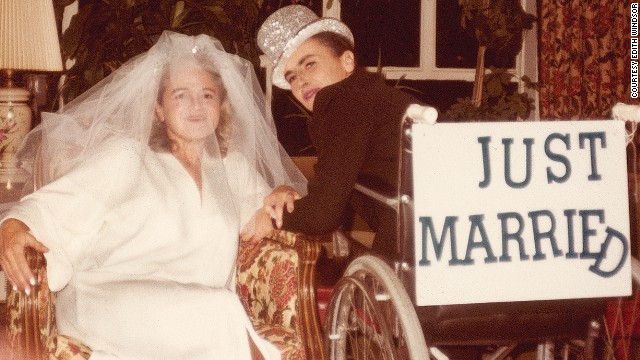Junk Explained: Marriage Equality And The Supreme Court
You've read a lot about Proposition 8, the Defence of Marriage Act and the United States' Supreme Court this week. But will anything actually change?

Hooray! The Supreme Court of America is taking on gay marriage!
Not quite.
But everyone has changed their Facebook profile pictures to be red equal signs. I thought the moment was now!
Yes, but marriage equality would only be, at best, an indirect outcome of two pieces of reasonably specific litigation. The question of gay marriage as an inalienable right of US citizens isn’t actually being considered by the Court.
But what about all these party poppers I bought?
Keep them for the Game of Thrones premiere.
–
What’s the story?
Well, there are two cases which have been heard on consecutive days that both deal with gay rights, but more as a symptom of the relationship between federal and state government.
Tuesday’s case, Hollingsworth v Perry, concerns the infamous Proposition 8, a measure that otherwise mild-mannered and liberal Californians passed in 2008 that constitutionally prohibited their state from allowing people of the same sex to marry.
Wednesday’s case, United States v Windsor, takes on the constitutionality of the rather more wide-reaching Defence of Marriage Act, which prevents the American government from recognising same-sex marriage – even if a state legalises it, as nine have done.
Case #1: Hollingsworth v Perry – Proposition 8
The case against Proposition 8 has been moving through the US court system from pretty much the moment that a loose coalition of Mormons and other religious fascists conspired to nudge through a citizen-led referendum under the shadow of Obama’s election victory. Almost every court that has considered the law so far has overturned it due to its violation of the equal protection rights of the US Constitution. As the logic goes, you’re simply not allowed to decree that one particular class of people should be stripped of so fundamental a right. The oft-cited precedent is Loving v Virginia, a 1967 case where the Supreme Court found that laws prohibiting interracial marriage were unconstitutional. Although, even with this prohibition it took Alabama until 2000 to hold a referendum to remove their version of the law from their books. It passed 60-40, meaning that in the year 2000, 40% of Alabamans still opposed interracial marriage.

Surely that means the Supreme Court will have to say prohibiting gay marriage is unconstitutional then?
Well, there’s two things standing in the way: the reluctance of the court to engage in wholesale social engineering; and the liberal-conservative split on the Supreme Court bench.
For all its significant moments, the Court prefers to be an institution that limits rather than expands. Those cases where particular, active rights were enshrined nationwide – i.e. Roe v Wade which essentially legalised abortion, and the abovementioned Loving v Virginia – tend to be a way of browbeating recalcitrant states who haven’t caught up with the rest of society. For all its popular support – cresting 60% in some polls – gay marriage remains an intensely geographically divisive issue in the US. 31 states have passed constitutional amendments banning same-sex unions. In comparison, only 9 have passed legislation allowing gay marriage, and of those almost all are those tiny, well-to-do states surrounding New York. The Court may be wary of simultaneously shredding the constitutions of two-thirds of America over a topic that still makes large swathes of the population vomit in rage.
This is further bolstered by the current make-up of the court, which has four liberals (Sotomayer, Ginsburg, Breyer and Kagan), four conservatives (Roberts, Scalia, Alito and Thomas), and one swing vote (Kennedy). So basically, for any politically divisive issue you’d care to name, it all comes down to how Justice Kennedy chooses to vote.
Despite his reputation for flexibility – and long-standing support of gay rights – he errs on the side of judicial conservatism more often than not, and his questions on Tuesday showed a man deeply uncomfortable with the idea of using the court to so boldly go where only a few have gone before.
What will they do, then?
Potentially nothing. Meaning that Proposition 8, having already been rejected by the courts, would wholly and finally vanish from existence. Which would be a good thing for Californians, even if it falls far short of the watershed moment hoped for by marriage equality advocates.
To explain: during questioning on Tuesday, many in the Court – liberal, conservative and Kennedy – seemed uncomfortable with the idea of dealing with this case at all. A lot of their questions revolved around the often fringe idea of “standing”: that is, whether the people who are currently arguing the case actually have the right to be there. Because Proposition 8 came in against the Californian legislature’s wishes, when a suit was bought to repeal it the Governor of California decided not to take part. So, a group of “concerned citizens” (read: religious nutbars) stood against Proposition 8 instead.
This isn’t the most orthodox situation, but these “concerned citizens” would probably be allowed to make their case if the Court was a little more comfortable with the idea of making a sweeping, US-wide statement on marriage equality. But the liberals are worried about Kennedy siding with the conservatives and creating a nation-wide precedent that sets gay marriage back decades, the conservatives are worried about the reverse, and Kennedy kind of wishes he wasn’t there.
So, because it’s unlikely that the Supreme Court will make a ruling deeming the banning of same sex marriage unconstitutional for the whole of America, I see two possible outcomes, both essentially a zero-sum game:
1. Kennedy sides with the liberal judges in rejecting Proposition 8, but they phrase it in such a way that it applies only to California.
2. Roberts sides with the liberal judges (and perhaps Kennedy) in refusing standing, thereby guaranteeing gay marriage in California, but side-stepping the need to make a comprehensive decision on marriage equality per se.
Can I blow a party popper yet?
No.
Case #2: United States v Windsor – The Defence Of Marriage Act
In a moment of high cowardice back in 1996, Bill Clinton passed the Defence of Marriage Act (DOMA), a pre-emptive strike against the nascent gay marriage movement designed to appease the Republicans in Congress. Things have changed quite a bit in the intervening decade and a half though, and these days the White House refuses to even defend the legislation in court.
So, who does defend the legislation?
The Republicans.
They sound like dicks.
They really are.
So, what’s the United States v Windsor about?
After 40 years together, Edith Windsor, a then 77-year-old New Yorker, married her girlfriend Thea Spyer in Toronto in 2007. This is them:

Spyer is in a wheelchair because she was dying from multiple sclerosis, a disease that claimed her two years later, after many, many years of being cared for by her adoring wife. New York law at the time permitted the recognition of same-sex marriages carried out in other jurisdictions, meaning she should have had full inheritance rights as guaranteed by the state. However, because of DOMA, any federally based tax was required to ignore the totality of these women’s lives together, and so Windsor found herself with a $363 000 tax bill that she would never have had to pay had her partner’s name been, say, Theo.
That’s awful.
Yes it is. Which also explains why this case has a significantly greater chance of broad success than the Proposition 8 suit. DOMA has been a blight on the US landscape for years, an over-reaching smear that affects over 1100 pieces of legislation and hundreds of thousands of people. Very few are explicitly comfortable with it anymore, but it’s taken the right case and the right plaintiff to get it to a point where the Supreme Court could legitimately strike it down. Because unfairly taxing a photogenic, charismatic 83-year-old widower who spent years caring for the love of her life as she slowly died of multiple sclerosis is not a good look.
So, DOMA is finally going then?
Probably. As could be expected, the four liberal judges were against DOMA because it’s goddamn awful and explicitly discriminatory, and the four conservatives – well, who cares. But Kennedy also expressed his scepticism with the law, albeit more in terms of his worry about federal overreach than anything else – the same rationale he used for opposing the US healthcare law. Perhaps the Federal government simply shouldn’t be in the business of regulating marriage.
Still, a win would be a win no matter how it was crafted and while the outcome wouldn’t actually expand the reach of gay marriage any further, it would make “gay marriage” simply “marriage”. And that’s a kind of important step in itself.
–
Luke Ryan is a Melbourne-based freelance writer and comedian. He is currently working on his first book, has written for The Age, Smith Journal, The Lifted Brow, TheVine, Crikey, Kill Your Darlings and many more, and performs with a sketch comedy outfit called the Lords of Luxury. He also has a law degree, but would rather physically explode than use it.